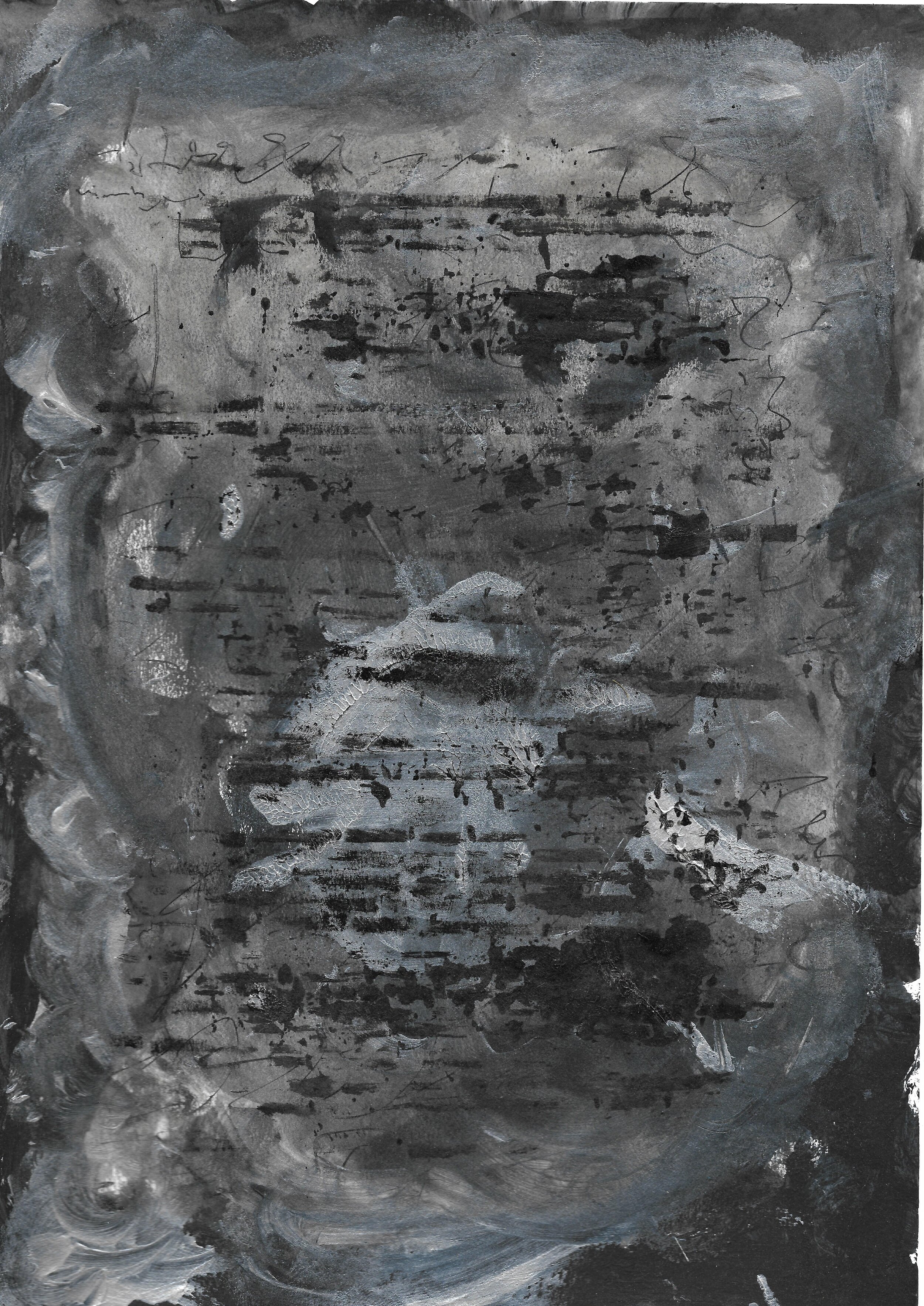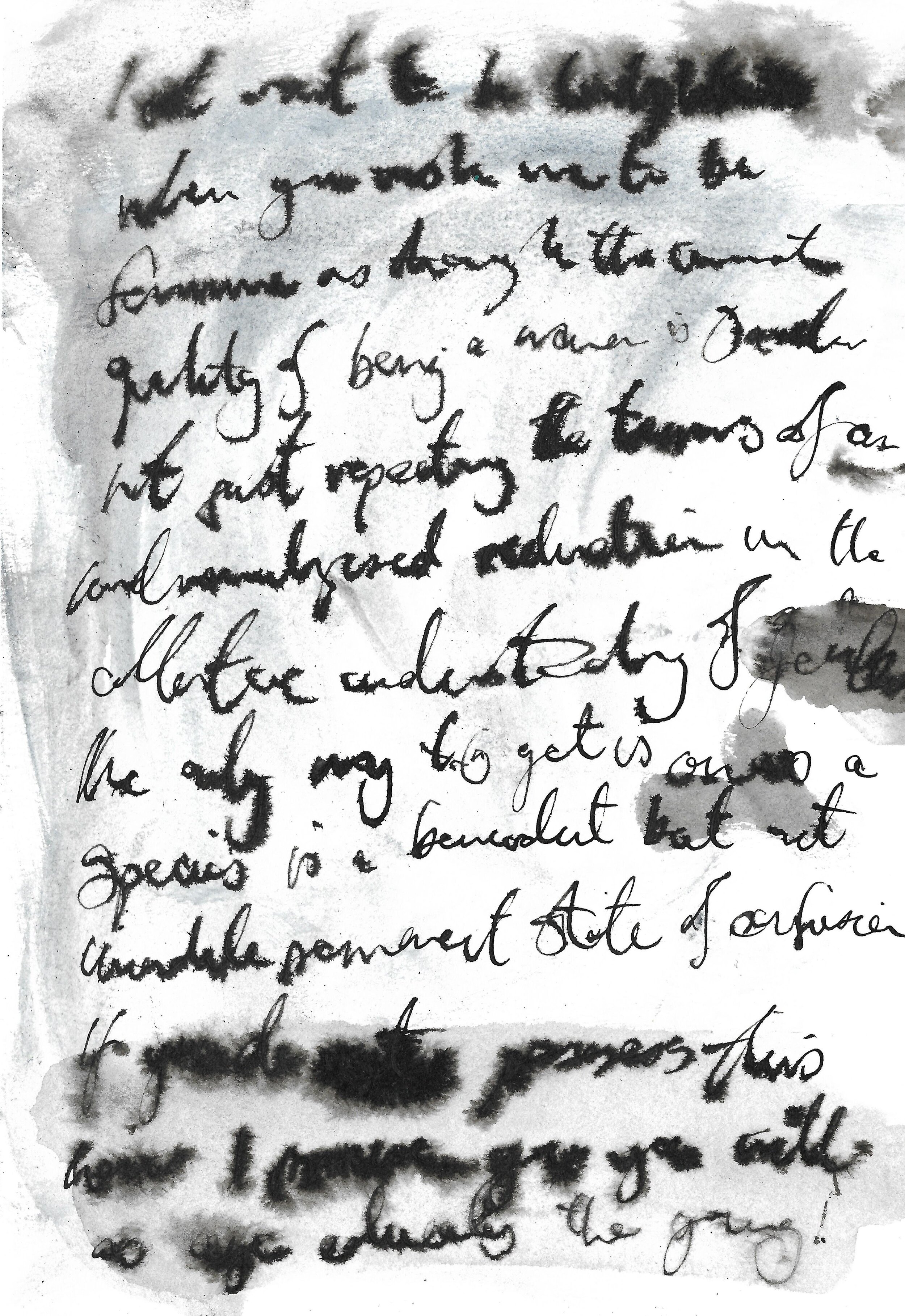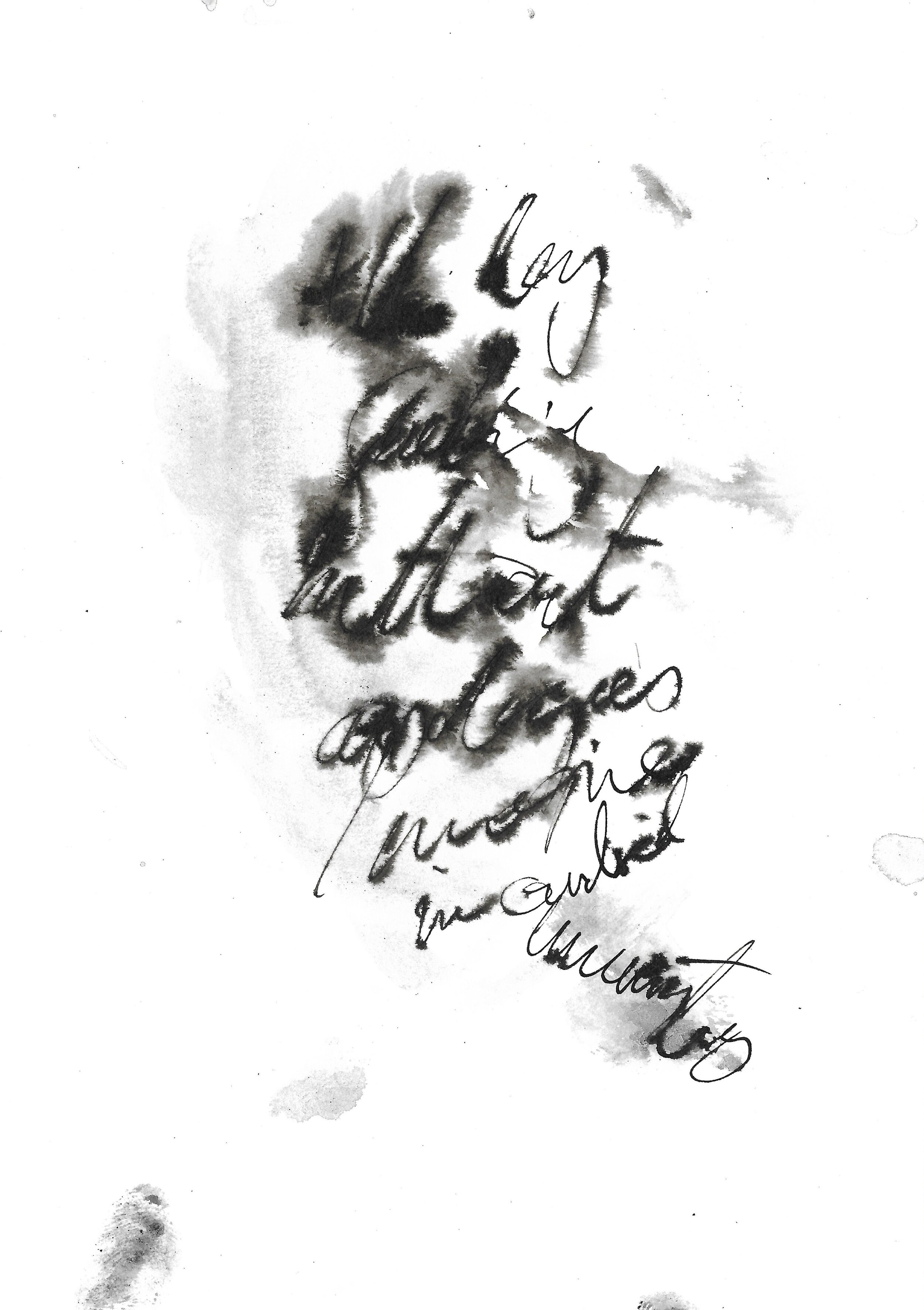Aletta Ocean Alphabet Empire
Are letters shaped like bodies? Can words evoke faces, captured in a screen? Who, or what, is assimilating, who or what?
Aletta Ocean’s Alphabet Empire (Hesterglock Press) is a collection of art poems, hand wrought in black, grey, silver and white, fashioned with Indian ink, paint and pen, worked with techniques that edge around writing, vying with abstraction, constantly harrying semantic meaning and legibility. My concerns are sex, poetry and pornography and the disconnect between the former and the latter. These images explore technology in its absence and aim to evidence the power of materiality and the body, and our hands, that are still required for touch.




The Online Empire
The whole business of eroticism is to destroy the self-contained character of the participators as they are in their normal lives.
- Georges Bataille
You can never discover for yourself what you’ve been given. Bodies and knowledge, both. The primary purpose of this book is to worry about the division between the experienced and the perceived, and what is lost between that ever expanding gap.
Bataille suggests that you try to imagine yourself changing from the state you are in, to one in which your whole self is completely doubled. He means this to be a disturbance. He reminds us, you would not survive this process since the doubles you have turned into are essentially different from you. Each of these doubles is necessarily distinct from you as you are now, as while you’ve split into two new versions of yourself, you cannot be the same, twice over. A kind of procreation is what he is suggesting and the metaphor is about writing, I think. To mark the pages then release them is to indulge oneself, fundamentally, in a productive onanism. Cells dividing, with some of that division escaping you. No wonder it feels sad, a let down, to release things into the world.
At some event, I’m watching a panel of speakers talking about something banal. The title is specious, it’s designed to intrigue but not offend. It’s a turgid literary festival, stuffy and fake, but the panellists keep talking about sex. They are almost battling each other over it. It is awkward, and insistent, but not, perhaps, for the reasons they’d imagine. They are desperate to appear comfortable with the notion of sex and in so doing are opening a gap between themselves and sex itself. Gone is anything remotely evocative of the experience, from within, within consciousness. I do not believe them too, it is a falsehood which is designed to make the audience comfortable while appearing to be discomforting. Aletta flits across my mind, as I’m actively daydreaming an escape, and it occurs to me there seems nothing more unerotic than poets talking about sex.
A teenager on the bus, sitting in front of me, is watching hardcore pornography on his phone. He doesn’t have earphones in, he just has the sound turned right down. I can see there’s actually subtitles on the tiny screen. The words change, and the bodies rearrange themselves, in sequence, in different positions. He’s watching it and barely moving. He’s wearing a school uniform. The actors, they must have to reset for each shot I think, disengage, as it looks cheaply made, so it’s unlikely to be a multi-camera production. They probably resent that, having to break free of contact.
Sex can be inverted, turned inward. Evoked by language but then not only distant but paradoxically absent in that evocation. Is there, aside from death, a more powerful example of language’s limits? Where else is the failure of expression, and the hyper-failure of poetic language more readily obvious, than when it is discussing fucking?
Poetry and pornography are planets around the same sun. They are both smug in their attempt to evoke their subject, and both do damage for this fact. Both pattern the mind to experience and lessen possibility by claiming themselves as insightful to that which they cannot be. They are both modern metaphysics in that way. So how does one write a poetry, or something to that effect, about sex?
Do letters look like human bodies or is this a kind of useful anthropomorphic tunnel vision I’ve developed after staring into pages, exhausted? Are lost, handwritten letters shaped more like human bodies than those typed? Are letters faces, in their character? Too much time with Henri Michaux? Then I have to ask, why are alphabets in the order they are in? There will be an answer on Wikipedia. I want to avoid that, more typing. What colour are letters, most often? Does the computer screen alter the letter? I look closely, at the pixels. Those colourful letters, what are they doing together? How do they make more letters? Shapes, vaguely resembling human bodies, interact on tiny mobile phone screens, atop of two bodies, slamming into each other. I’m not looking at letters anymore, but blotches that were once letters. Unintelligible words. The more casual they try to appear, the more public, the more they show how ‘comfortable’ they are, in their neat books, the more I can start to see them mate with themselves and from this colour cloud I can see them, like us all, hunched over somewhere, curtains drawn - black liquid, animal heads, temporary blackouts, confused apologies, olfactory encouragement, clumsiness, sorrow, strains and stains, amidst the nice stuff and pleasure and child-making. In their defence, this would not be without it being somewhat behind drawn curtains.
There’s Aletta, perhaps bored, almost made of plastic, stretched out, away from these people at literary festivals, and their human senses. In her I can see endless showers, dryness and excruciating conversation. I see myself, of course, online. Women and men made of rubber, inky abstracts, I see Henri Michaux again, black gashes on the page. This seems to connect. Rubber multi-millionaires, neat notes, shapes in writing, sketches. On screen, they have so few blemishes they look like one giant glowing cut. They are a massive distraction. They make the organ work, but utterly without touch / sight / smell / sound / balance. Immaterial marks are then a bridge between the body and the plastic coming up over the horizon.
This book stopped being computer poems, word document poems, when it was forced against the endless wastes of sex that live in almost every computer. The same machine that makes the poems carries the pornography. I intend it as contemporary because it was made with liquid and paper.
Poems can be said to be unified by their lack of colour. Would a serious poet move to the tab at the top of their document and select a colour for their words? If it’s colourful, it’s not poetry. Poetry is unified in its worry about what non-colour absorbs, and rarely worried at all about what writing is and isn’t, in the context of being on a screen or in a book. Even though the conditions are very particular. For poetry isn’t just language, is it?
Maybe here, in that space, away from what the words mean, I’m getting a bit closer. For I can try to take writing for granted, but when I started writing, I did so with crayons. On paper definitely. How I liked to taste the crayon and the paper. To smash it up and bin it, to put it into my mouth, lick it maybe. Tasting the thing that I am writing with. Colourful saliva might indeed by a key ingredient to my early works, a child ink.
I think again, that which has been given to me, I cannot rediscover. There are territories I have been taught that I not only cannot see again with fresh eyes, but that I have to actively unlearn. The new knowledge, the right way, paves over that which had already been discovered, even if that was somehow more true, or important. These things get administrated, planned. I am thinking of poetry and sex simultaneously. This is the central problem of dealing with what appears to be my own essential, immutable capabilities, which do seem to exist and cannot be escaped. More than my own biology, which requires understanding, or at least an attempt to do so, knowledge that I have entirely inherited, later than many and that I am suspicious of for that fact, seems to me now, to block the arteries of what I might’ve have discovered in my explorations. It is necessary, for me accrue knowledge, but this is not the same as being given it. That is a gentle word for how we often learn, for nothing seems to be given innocently.
I find myself producing things I think are forgettable, around ideas which I sense are not. I wonder, why? Is this also mirroring sex, special at first but diminishing in return? Virtually no one observes me. I am very sure, and more so with each passing popular / populist work, that getting people to offer more observation on my productions has nothing to do with my reason for producing. Do I enjoy it? Not that much. It does not alleviate this nagging sense that I am wasting. I am compelled, certainly. What else am I going to do? If it goes well, I am absorbed, I lose that time. If it goes badly I sit hard and ask myself what I am bothering to do this?
Bataille says that physical eroticism has a heavy, sinister quality. It holds on to the separateness of the individual in a rather selfish and cynical fashion. Emotional eroticism is less constrained. What to make of an eroticism that is neither physical or emotional? It would be like a book of poems that mimics poems, grotesquely. That aims to be read after being seen. After showing the face, the skull beneath, the humping gaze. The lines that are the faces, eyes shut, lost in something, with words about but often, not helpful, harmful even. And the lack of colour, something being marked, absorbed, intimidating and leaving behind the appearance we would have for ourselves. Always an approximation then, always, at some level, muddy, muddled, foolish – that is the nature of things, at their root, at the entry point of connecting and departing.
Click here to purchase a copy of Aletta Ocean’s Alphabet Empire (Hesterglock Press) directly from the publishers.
To read more excerpt-articles from Project Jupiter, Mercurius’s ever-growing anthology of indie press titles, click here.
